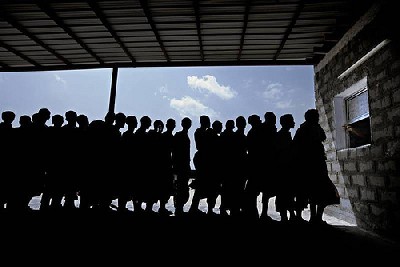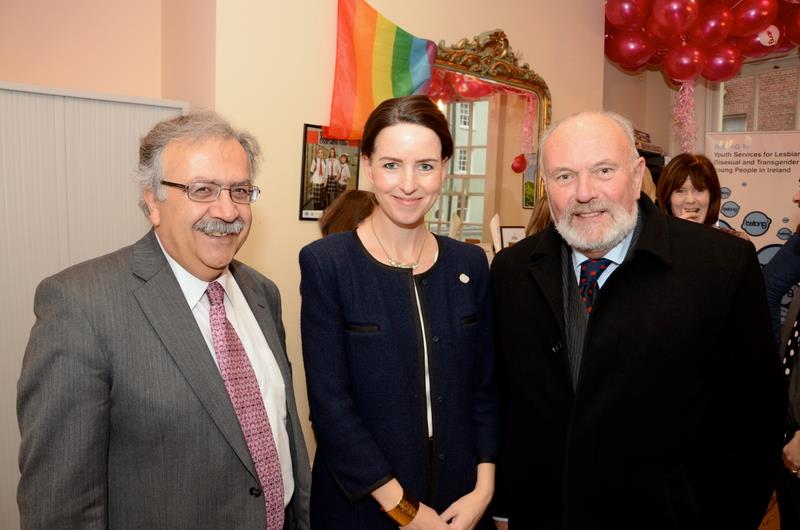In Search of Safety: LBGTI Asylum-Seekers and Refugees in Ireland
03 December 2013
Raped and tortured, both mentally and physically, Emma* fled home six years ago.
Forced in to hiding, she had no long-term option but to flee. In 2007 Emma sought asylum in Ireland based on her sexual orientation and this year she was granted refugee status.
“My life was in danger as a lesbian woman. My only wish and hope was to get out of the country and save my life.”
Her case is not unique. Over 80 countries have criminalised homosexuality, making it both difficult and dangerous for two people of the same sex to have a consensual, loving relationship.
The level of discrimination against lesbian, gay, bisexual, transgender and intersex (LGBTI) people varies significantly from country to country, in certain states homosexuality can result in a prison sentence while in others the death penalty is exercised.
Such laws place pressure on individuals to conceal some of the most fundamental aspects of their identity, which can cause considerable mental health strain. Furthermore, this type of state sanctioned discrimination begets prejudice at societal level which in turn can lead to persecution of the LGBTI community.
Indeed governments routinely overlook this violence and discrimination, the first ever United Nations’ report ‘Discriminatory laws and practices and acts of violence against individuals based on their sexual orientation and gender identity’, elucidates clearly.The report which was produced by the United Nations High Commissioner for Human Rights details “a pattern of human rights violations… that demands a response,” outlining how violent incidents often go unreported because victims do no trust police. This despite the fact that “violence against LGBT persons tends to be especially vicious compared to other bias-motivated crimes.”
For Emma, that meant leaving a country that was “so homophobic and ignorant… they call us animals.”
Image: A still from the BeLonG To video 'Seeking Sanctury' which highlights the experiences of LGBT asylum-seekers and refugees in Ireland. The video is available to view here.
“The violation of a human right of a LGBTI refugee is no less a violation than it is for anyone else in society”
However, measures are now in place to protect LGBTI people around the world.
Countries which continue to condone the persecution of LGBTI individuals do so in direct violation of the Yogyakarta Principles, a set of legal standards which recognise the right of individuals to determine their gender identity and to freely express their sexual orientation.
The Principles, published in 2007, were deemed necessary given the ostracisation and vilification of those who are perceived as different to the norm.
 In fact Principle 23 directly relates to asylum, stating: “A State may not remove, expel or extradite a person to any State where that person may face a well-founded fear of torture, persecution, or any other form of cruel, inhuman or degrading treatment or punishment, on the basis of sexual orientation or gender identity.”
In fact Principle 23 directly relates to asylum, stating: “A State may not remove, expel or extradite a person to any State where that person may face a well-founded fear of torture, persecution, or any other form of cruel, inhuman or degrading treatment or punishment, on the basis of sexual orientation or gender identity.”
Professor Michael O’Flaherty, the eminent Irish academic who was Rapporteur of the Yogyakarta Principles, is quick to highlight the formal duty states have to protect those whose identities do not conform to heteronormative ideals: “The violation of a human right of a LGBTI refugee is no less a violation than it is for anyone else in society and states are and should be held to account internationally for their violations of the treaty obligations.”
Aligned to this, it is unacceptable for countries of asylum to suggest that individuals hide their true-selves in their country of origin to avoid persecution. UNHCR Ireland’s Head of Office, Sophie Magennis, states: “Just as a claim based on political opinion or nationality would not be dismissed on grounds that the applicant could avoid the anticipated harm by concealing his or her beliefs or identity, applications based on sexual orientation and gender identity should not be rejected merely on such grounds.”
Image: ©UNHCR/P.Hansen
“Supportive service providers could make an incredible difference.”
While the 1951 Convention on the Status of Refugees does not specifically mention sexuality or gender, a recent ruling by the Court of Justice of the European Union has stated that homosexual people constitute a ‘social group’ which is liable to be persecuted and thus must be given international protection  if they can prove that their safety is threatened. As a signatory to the 1951 Convention, Ireland is obliged to recognise as a refugee any person who has a “well-founded fear of being persecuted’ and who is “unable or unwilling to avail him— or herself of the protection of that country, or to return there, for fear of persecution.”
if they can prove that their safety is threatened. As a signatory to the 1951 Convention, Ireland is obliged to recognise as a refugee any person who has a “well-founded fear of being persecuted’ and who is “unable or unwilling to avail him— or herself of the protection of that country, or to return there, for fear of persecution.”
The momentum behind the equal rights movement in Ireland has gained traction in recent years, yet more needs to be done to meet the particular needs of LGBTI asylum-seekers and refugees. The 2012 BeLonG To report: Key Principles for Working with LGBT Asylum-Seekers and Refugees found that: “Safety and isolation for [LGBT asylum-seekers and refugees] was a serious issue, but that supportive service providers could make an incredible difference.”
An inclusive environment which recognises the dignity and humanity of LGBTI asylum-seekers and refugees is the minimum standard all countries must adhere to.
Professor O’Flaherty emphasises: “LGBTI refugees and asylum seekers are amongst the most vulnerable people in the world. They face discrimination and abuse because of their sexual orientation or gender identity across every aspect of their lives, it is imperative that any society that upholds human rights pays priority attention to the situation of these most vulnerable people.”
Image: UNHCR Head of Office, Sophie Magennis with Dr Nazih Eldin, Head of Health Promotion, HSE Dublin North East and Senator David Norris at the launch of the BeLonG To report on 31 January 2012.
*Name changed to protect anonymity
By Alana Ryan








